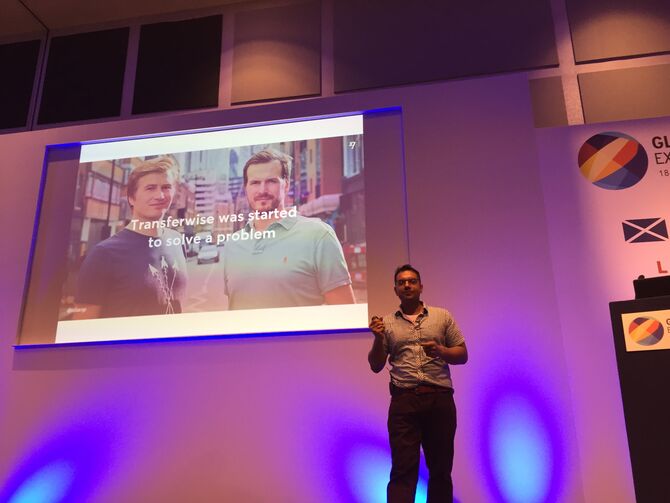How a currency transfer startup grew into a fintech giant
In a GXP Summit session on innovating abroad, financial technology firm Transferwise explained how an innovative culture had enabled it to grow from a startup in 2011 to a company valued at $1 billion.

A mission-driven startup culture
In a nutshell, the service enables users to transfer money internationally through a peer-to-peer network, at a fraction of the cost of doing so through the banks. The passion behind what the company does comes out when Nilan Peiris speaks, and it informs the Transferwise culture."We actually describe ourselves internally as a mission-driven startup," Mr Peiris said. "The mission is to take price, speed and convenience all the way to their apogee … The 2.5 per cent of the world's GDP that's tied up in money transfers can drop all the way down, and we see ourselves as the catalyst for achieving that."The objective of our culture is to achieve that mission as quickly as possible."Getting into the nuts and bolts, he went on, "The way we do that is by running autonomous teams empowered around KPIs. For example, we've got a team launching new currencies, empowered to figure out which currencies to launch with all the resources they need."If you think about achieving the mission, there are about seven or eight problems that you need to solve, and we have teams learning to solve the problems. As they do that, the KPIs move and the growth rate moves."That team structure is then extrapolated internationally."If you think about expanding globally – we have offices in London, Tallinn, Ukraine, New York, Sydney, Singapore, Tokyo and Budapest now, up from just two, three years ago – what we're really doing is scaling those teams globally," said Nilan Peiris."Within those teams, you'll find product managers, engineers, payment operators, marketeers, customer support, regulatory compliance, and legal. And much like most organisations, we have a matrix function with the reporting line down to the VP of engineering for the engineers, the head of product, marketing. But the identity is within those teams that are solving those problems."Related news from the 2017 GXP Summit:
- How a currency transfer startup grew into a fintech giant
- GXP Summit: When should startups expand overseas?
- Global Mobility: operating in the post-Brexit marketplace
- GXP Summit: Optimising global talent pools
- Expanding globally: how do you acquire talent in the US?
Brexit fears over accessing global talent
The threat of Brexit looms, however, and Transferwise is concerned about the impact that will have on the company's ability to access talent."We started Transferwise in the UK because it was a really good place to start from a fintech perspective – financial services sector, access to the single market, access to great talent," said Nilan Peiris."Most of those reasons still hold true. Obviously, the things we care most about are freedom of movement for talent and passporting rights to the single market. We're still a way away from understanding what Brexit actually means, but those are two areas we lobby quite extensively on."Transferwise said in April that it would move its European headquarters to the European continent by March 2019 because of Brexit, in a blow to the UK as it seeks to hold its position as a global fintech hub. The company's global HQ will remain in London, where it currently employs 120 people."Uncertainty means that maybe, if you're building the next fintech business, you shouldn't build it in London today, until everything clears up again and we understand what’s going to happen with access to talent and so on," the company's CEO and co-founder, Taavet Hinrikus, told Reuters.Fiona Murchie, Relocate Global’s managing editor, was moderator and chairperson of the Global Sourcing, Logistics and Mobility sessions at the Global Expansion (GXP) Summit in London.
For related news and features, visit our Enterprise section.Access hundreds of global services and suppliers in our Online Directory
 Get access to our free Global Mobility Toolkit
Get access to our free Global Mobility Toolkit 
©2025 Re:locate magazine, published by Profile Locations, Spray Hill, Hastings Road, Lamberhurst, Kent TN3 8JB. All rights reserved. This publication (or any part thereof) may not be reproduced in any form without the prior written permission of Profile Locations. Profile Locations accepts no liability for the accuracy of the contents or any opinions expressed herein.






































